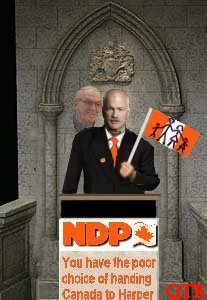When choosing where to place our votes, whether we intend this or not, we vote for the collective ideology, the
Weltschauen, or world-view of a party.
Both fascist and communist political failures – governments that can only retain power
only through dictatorship – demonstrate the dangers of the extreme right and the extreme left. Historically, the middle-of-the-road has proved to be the best fiscal and democratic policy in
free states. Both fascist and communist political agendas have ultimately proved themselves painful for the majority of the population.
Are the Regressive Conservatives fascist? No. The RC's do, however, favour the wealthy over the poor, and the RC's overt and covert platforms
will erode our surpluses and our social liberties and supports. The poor will suffer most. The already-wealthy will benefit most.
Why? Consider the proferred reduction in the GST versus income tax reductions for the poorest Canadians. The wealthy have higher discretionary incomes – more pocket money compared to money for necessities –
and the wealthy spend more on taxable items. This means that a reduction in the GST will
most benefit those who spend most on large-ticket items.
Those who spend comparatively less on
taxable items and services – the poor – will derive
very little benefit from a 1 - 2% reduction in the GST. Similarly, when Harper reduces corporate taxes, the working population's share of the tax burden will increase OR we must again incur a deficit as we did under Mulroney's PCs. Stephen Harper is well enough trained in economics to understand all of the above - he is merely counting on the fact that the average voter does not understand economics.
Paul Martin, as Liberal finance minister, turned the Conservative-created deficit into a surplus, yet many Canadian voters seem bent on punishing Paul Martin for the egregious AdScam behaviour of Liberal party hangers-on. Not elected Liberals, but civil servants such as work under any government.
At the leftist extreme, we cannot afford NDP support of
over-generous social programs OR the discrepancy of support only for those workers who belong to a union. Generosity is one of the good aspects of the Canadian, as opposed to American Republican,
collective psyche. It is just that we cannot afford to be
over-generous. This is one good reason for having the NDP as a
minority party when Liberals are in power – the balance tends toward generous. An NDP minority would be powerless against a Regressive Conservative majority, and
under-generous will take the day – for 5 years! – while the already-rich will grow richer.
Under the Liberals, we have achieved the lowest unemployment rate in decades. However, the majority of Canadians of working age have worked even when unemployment is at its highest. In other words, most of us, whether single or part of a nuclear family, are
working people, and
most of us do not belong to trade unions.
At the inception of trade unions, these tools for collective bargaining for the oppressed were essential to redress inequities. In the
modern economy, most trade unions operate as tools of cooperative blackmail in industries whose workers are not oppressed, but whose products or services are essential in some way – for example, public transit and mail delivery (before the electronic-communication revolution).
Similarly, collective blackmail has been a potent tool for inequality in large consumer-product industries – auto workers are a prime example, and it is no accident that Ed Broadbent hailed from Oshawa.
Of course, the day-to-day operations of modern trade unions is not staging strikes, rather it often seems to be anti-meritocracy. That is, most trade unions seem to oppose dismissal of fellow unionists who would otherwise be dismissed for incompetence. This explains why standards of service are often lower in industries or services with large unions – merit does not matter, "brotherhood" does.
The ultimate result of decades of large trade unions is
comparatively excessive salaries in certain sectors of the economy. Left-leaning political parties support such inequities and do
not represent the
majority of working people and working families.
What constitutes an equitable salary scale? This is a complex question, but most would probably agree that remuneration ought to
reward special skills, talents, and advanced training, and ought to
compensate for highly unpleasant or dangerous working conditions.







